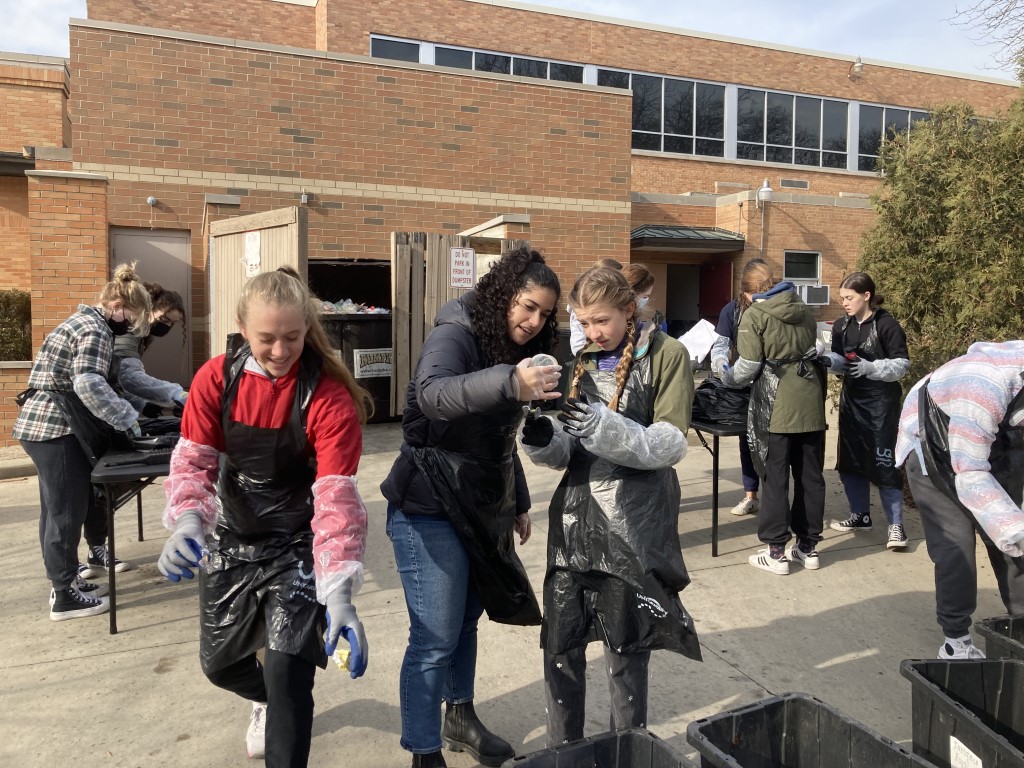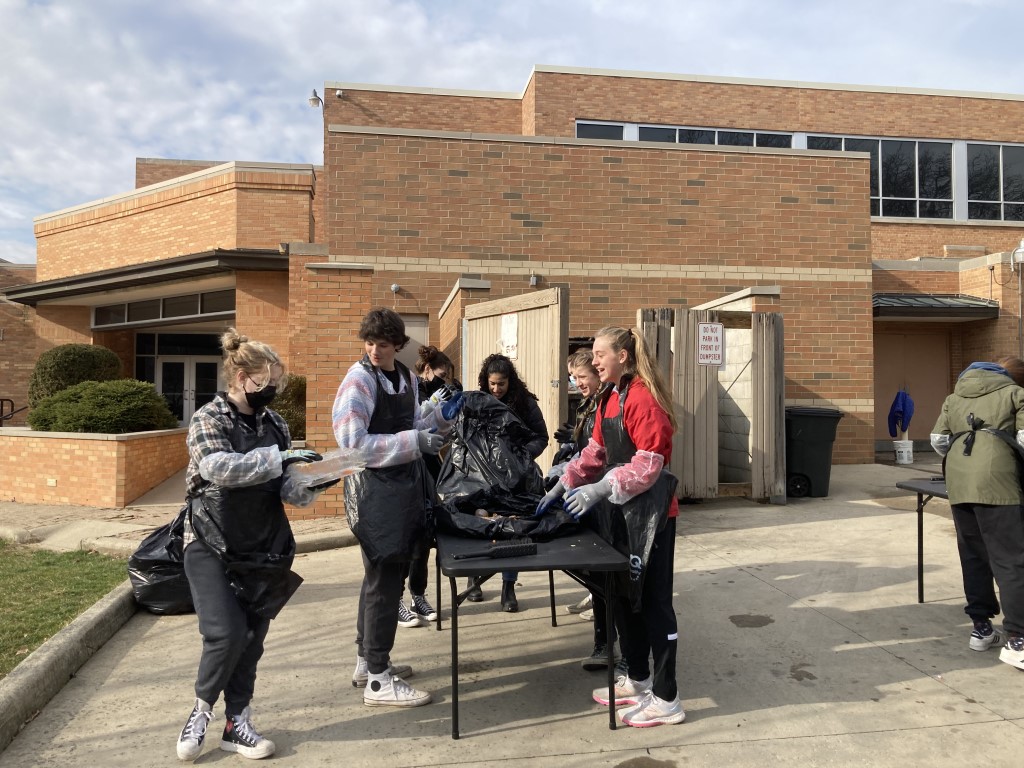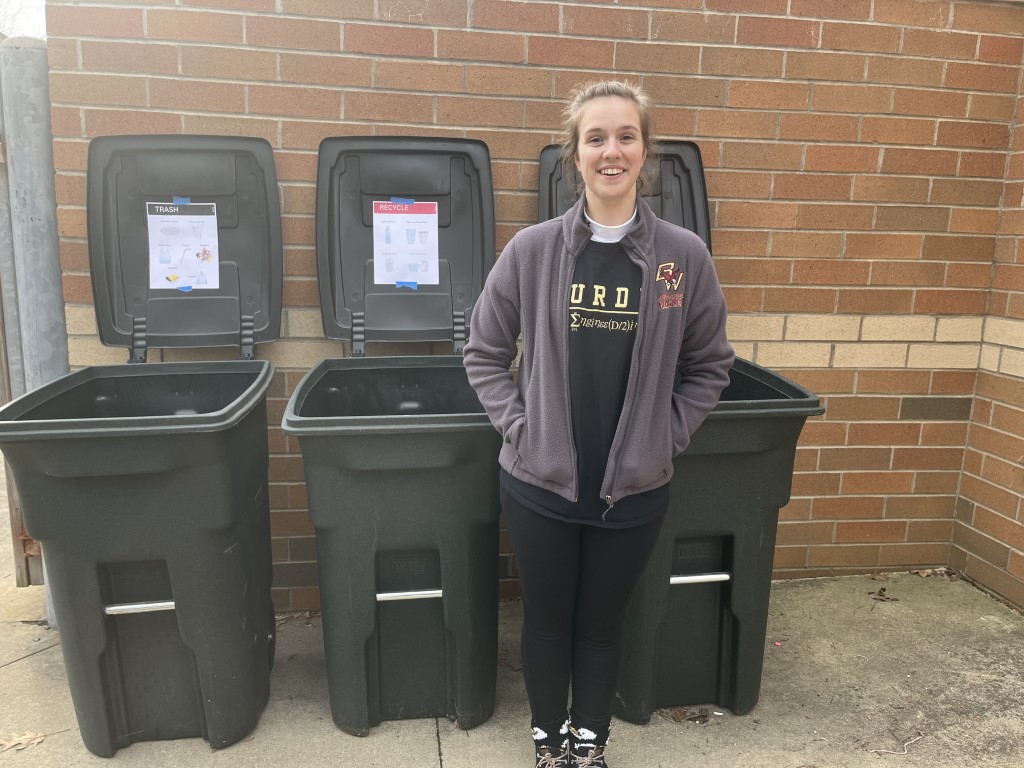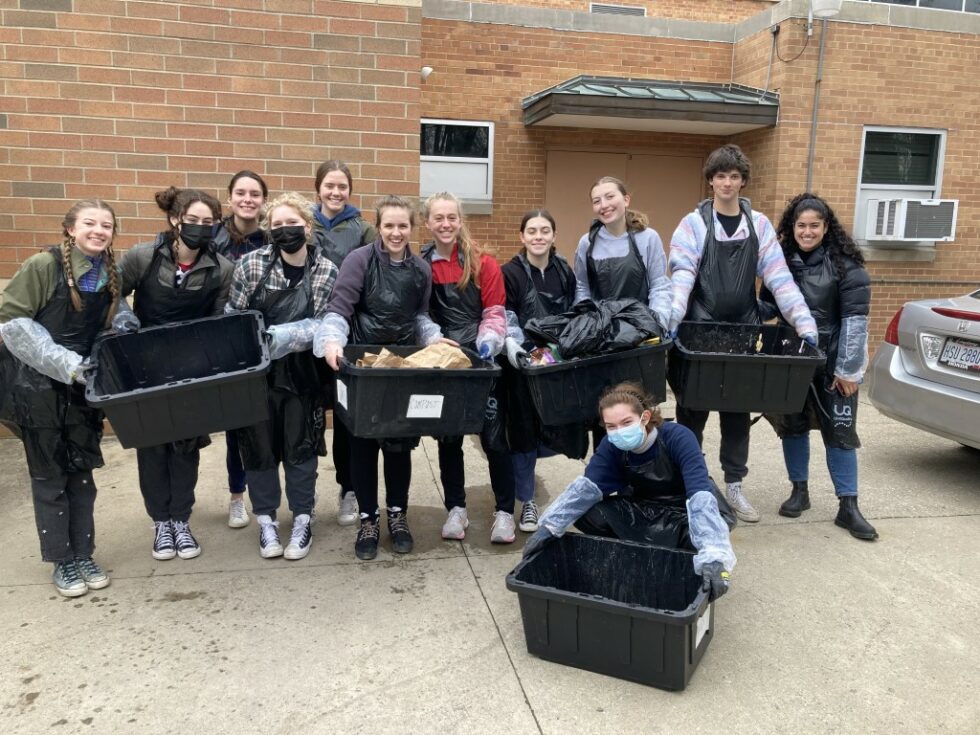Students Team Up with Alumna for Cafeteria Waste Audit
By all appearances it was a normal Tuesday inside the Bishop Watterson cafeteria but just outside there was a hub of activity near the trash receptacles. A dozen members of the Environmental Club were performing a waste audit. The students, wearing casual clothes with aprons and gloves, were busy sorting every piece of waste into bins.
Leading them through the audit was alumna Dominique Hadad ’16, whose company, Green Scope, is geared toward increasing sustainability for local businesses by helping them to reduce food waste and potentially help bridge the food insecurity gap.
Hadad discovered a passion for environmental issues while a student at Bishop Watterson assisting teacher Will Reiss, who has since passed away.
“Mr. Reiss was very passionate about making the school more green, and that exposed me to how much I cared about making green transitions for organizations,” said Hadad, who studied Industrial Systems Engineering at Ohio State.
Green Scope was launched thanks to Hadad winning the Ohio State President’s Prize, a grant of $100,000 to fund a project.
Senior Sophia Schroeder, whose older brother was a classmate of Hadad’s, was inspired to get involved with the environmental efforts after observing her brother’s involvement with environmental concerns at Bishop Watterson. Schroeder has led the charge to revive the Environmental Club, which was less active when Mr. Reiss retired and had all but disappeared during the pandemic school years.
“We want everyone to realize that trying to recycle and at least making an effort to live more sustainably is possible,” Schroeder said. “We want people to know they do make an impact, even if they think they don’t, and that it’s their choice whether the impact is good or bad.”
“For us it’s about the care for God’s creation,” said senior Eliza Thomas. “It’s very clear that as a student body there’s so much in the back of our minds that we could actually be actively participating in. How our club is helping is a really nice form of prayer, to me. It’s God’s world and we have a responsibility to care for it.”
Club moderator and Theology teacher Ali Reis said the club has been taking an incremental approach with the student body, starting with making sure recycling bins were in classrooms and then making recycling pickups a part of the routine. The waste audit was the next step in discovering what to focus on with their education efforts. Green Scope will have audit results to the club in a couple of weeks.
For the waste audit day, waste cans in the cafeteria were labeled for recycling, composting and trash.
“It was surprising to see what people thought was recyclable versus what actually is,” said senior Ava Fultz.
Club members had noticed during regular recycling collections on school days that students toss tissues in the recycling bins, thinking they are recyclable. (They’re not.) During the lunch waste audit, their observations of their peers’ understanding of the different types of waste was greatly expanded. A common reflection was that students think of compostable food as produce only, not crackers or tater tots, for example.
There was an air of teamwork and camaraderie as the students helped each other sort their classmates’ lunch refuse.
“When I first met Dominique, she told me that environmental work was a ‘thankless job’ and that’s very true,” said Schroeder. “Mr. Reiss is remembered so fondly because he did a thankless job with grace and dignity and inspired others to be as selfless. When we ask people to join in our effort, we’re asking them to resemble Mr. Reiss in that way. We are asking them to do something that will at first inconvenience them and will challenge them to live not only thinking of those around them but also of those who will inherit the earth after them.”
Hadad credited Schroeder with motivating the club and pulling the audit crew together. After all, it’s not a common occurrence to observe a group of teenagers going through messy and smelly trash for the good of the world.
“They’re learning so much and when they get to college they’ll feel more confident to continue living with environmental consciousness and educating others,” said Hadad, who has been involved with managing student volunteers for Ohio State’s composting expansion efforts.
“We see it at Ohio State. The students who come from local schools where they were involved in recycling efforts are more effective leaders in this area.
“It feels full circle for me to remember how it felt to be in the classroom, wanting to impact change, and now to be back at Bishop Watterson seeing that students are motivated to do this work,” said Hadad. “It will be helpful to put numbers to what is being discarded. We’ll be able to take those numbers and suggest strategies, things that are practical for Watterson to put in place. What really matters is that students learn they can take actions to make a difference.”
In thinking about the possible next steps, junior Jason Thomas said he would like to see the school begin to compost.
“There’s a lot of waste, not only at school but all over, and it would be nice to know that something is being saved.”
Mrs. Reis said the future is bright for the Environmental Club.
“We have some very motivated students who are willing to step up in the future and I have no doubt they are going keep this effort moving forward at Bishop Watterson,” she said.





